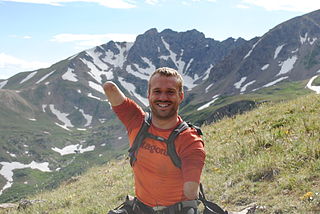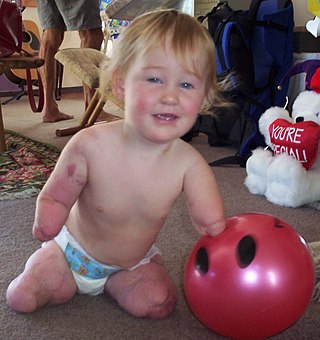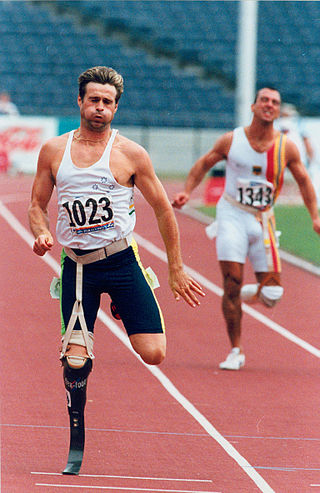Related Research Articles

In medicine, a prosthesis, or a prosthetic implant, is an artificial device that replaces a missing body part, which may be lost through physical trauma, disease, or a condition present at birth. Prostheses are intended to restore the normal functions of the missing body part. Amputee rehabilitation is primarily coordinated by a physiatrist as part of an inter-disciplinary team consisting of physiatrists, prosthetists, nurses, physical therapists, and occupational therapists. Prostheses can be created by hand or with computer-aided design (CAD), a software interface that helps creators design and analyze the creation with computer-generated 2-D and 3-D graphics as well as analysis and optimization tools.
Hand transplantation, or simply a hand transplant, is a surgical procedure to transplant a hand from one human to another. The donor hand, usually from a brain-dead donor, is transplanted to a recipient amputee. Most hand transplants to date have been performed on below-elbow amputees, although above-elbow transplants are gaining popularity. Hand transplants were the first of a new category of transplants where multiple organs are transplanted as a single functional unit, now termed vascularized composite allotransplantation (VCA).

Amy Michelle Purdy is an American actress, model, para-snowboarder, motivational speaker, clothing designer and author. Purdy is a 2014 Paralympic bronze medalist, 2018 Paralympics silver medalist, and co-founder of Adaptive Action Sports.

Kyle Maynard is an American speaker, author and mixed martial arts athlete, known for becoming the first quadruple amputee to ascend Mount Kilimanjaro without the aid of prosthetics. He is also founder of the No Excuses Crossfit gym.
Cameron Clapp is an American athlete. As a triple amputee, he has become a motivational speaker, mentor to young amputees, and amputee activist. He is also an actor.

Charlotte Lucy Cleverley-Bisman is a New Zealander known as the face of a New Zealand campaign to encourage vaccination against meningococcal disease after contracting and surviving severe meningococcal sepsis. She was nicknamed "Miraculous Baby Charlotte" by her fellow New Zealanders as a result of making headlines worldwide after recuperating from a series of life-threatening complications. She is the daughter of Pam Cleverley and Perry Bisman.
Van Phillips is an American inventor of prosthetics.
Therdchai Jivacate is a Thai orthopedic surgeon and inventor known for his humanitarian activities in providing free prosthetic limbs to impoverished amputees, and for his development of techniques allowing low-cost, high-quality prostheses to be made from local materials. The activities of the Prostheses Foundation, which he founded in 1992 under royal sponsorship from the Princess Mother Srinagarindra, have expanded beyond the borders of Thailand to Malaysia, Laos, and Burma. Jivacate has established Thailand's first and only educational institution of occupational therapy at Chiang Mai University. He has also created an educational programme for children suffering from chronic diseases at Maharaj Hospital in Nakhon Ratchasima. In 2008, he was given the Ramon Magsaysay Award for Public Service.
Amy Palmiero-Winters is a below-knee amputee, long-distance runner, and triathlete. She holds eleven world records in various events. In 2010, she was awarded the James E. Sullivan Award as the top amateur athlete in the United States and the ESPN ESPY Award as the top female athlete with a disability in the world.

T44 is a disability sport classification for disability athletics, applying to "Single below knee amputation or an athlete who can walk with moderately reduced function in one or both legs." It includes ISOD A4 and A9 classes.
Bebionic is a commercial prosthetic hand designed to enable amputees to perform everyday activities, such as eating, drinking, writing, typing, turning a key in a lock and picking up small objects. The first version of the Bebionic hand was launched at the World Congress and Orthopädie & Reha-Technik, Trade Show, Leipzig, Germany, in May 2010. Designed in the United Kingdom, the Bebionic hand is manufactured by RSL Steeper and is available worldwide. Since February 2, 2017, Bebionic is owned by Ottobock.
Melvin Jacob Glimcher was an American pioneer in the development of artificial limbs. He helped develop the “Boston Arm,” the electronically-operated design of which was incorporated in many later prostheses.
Alice Drew Chenoweth (1903–1998) was an American physician who specialized in pediatrics and public health, and served as the Chief of the Division of Health Services in the United States Children's Bureau.
Ethics of bioprinting is a sub-field of ethics concerning bioprinting. Some of the ethical issues surrounding bioprinting include equal access to treatment, clinical safety complications, and the enhancement of human body.

Tilly Lockey is a British social media personality and amputee known for her bionic arms developed by Open Bionics, which she has used since 2016. In 2021, she competed and went on to win the sixth series of the CBBC competition series Got What It Takes?.
Claire B. Panosian Dunavan is an emeritus Professor of Medicine at the University of California, Los Angeles. Her research considered global health and diseases, including parasitic infections, tuberculosis and malaria. Panosian served as president of the American Society of Tropical Medicine and Hygiene in 2008. She is also a science writer, reporter and television presenter.

Adenike Dasola Oyetunde-Lawal, professionally known as Adenike Oyetunde is a Nigerian media personality, radio host, author, lawyer, social media influencer and life coach. She is the founder of Amputees United Initiative and The Gratitude Hub. In 2021, she was appointed by the Lagos State Governor, Babajide Sanwo-Olu, as the senior special assistant on persons living with disability.

Jeff Bourns is an American amputee tennis player who helped pioneer the growth and development of Adaptive Standing Tennis.

Mandy Horvath is a Colorado based American bi-lateral above knee amputee, creative writer, public speaker, actress and mountaineer. She is notable as the first female bi-lateral amputee to summit the Manitou Incline, Pikes Peak (twice), the Statue of Liberty stairwell to the crown, and Tanzania's Mount Kilimanjaro, without the use of prosthetic equipment- using her arms and hands to crawl. Her successful ascent of Mount Kilimanjaro also awards her title of the first legless woman to summit one of the world's Eight Summits without the aid of prosthetic equipment.

Aadeel Akhtar is a neuroscientist and electrical engineer. He is CEO and founder of the bionics company PSYONIC. In 2021, he was named one of MIT Technology Review’s 35 Innovators Under 35 and was featured in Newsweek’s “America's 50 Greatest Disruptors: Visionaries Who Are Changing the World.”
References
- 1 2 Larry Gordon (2007-05-27). "Dream Defies Loss of Limbs". Los Angeles Times. Retrieved 2008-03-07.
- ↑ "Student to Become Pediatrician With 1 Arm, 2 Fingers". WMAQ Chicago. 2007-05-29. Retrieved 2008-03-07.
- ↑ Jane Der (2007-06-10). "Meningitis Survivor Fulfills Dream". Daily Bruin. Archived from the original on 2008-05-11. Retrieved 2008-03-07.
- ↑ "Triple Amputee to Graduate from Medical School". CNN. 2007-05-29. Archived from the original on 2008-03-08. Retrieved 2008-03-07.
- ↑ Charles Gibson (2007-06-01). "Person of the Week: Kellie Lim". ABC World News. Retrieved 2008-03-07.
- ↑ Meredith Buse (2002-02-08). "Campaign for Campus Accessibility Raises Awareness". The Daily Northwestern. Archived from the original on 2008-02-17. Retrieved 2008-03-07.